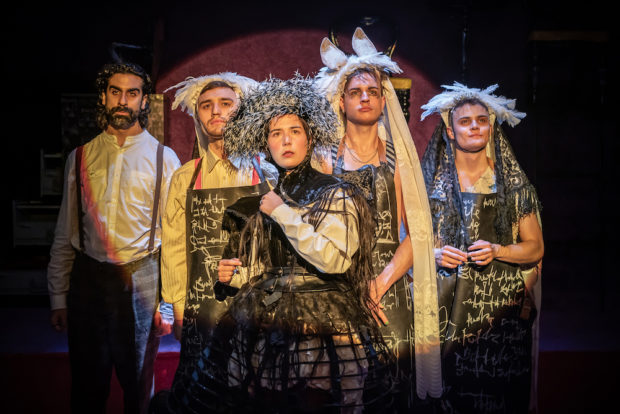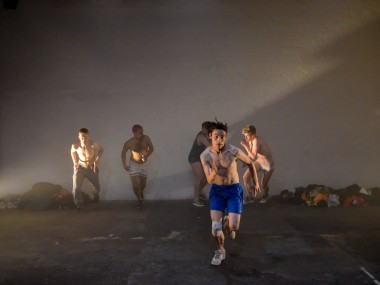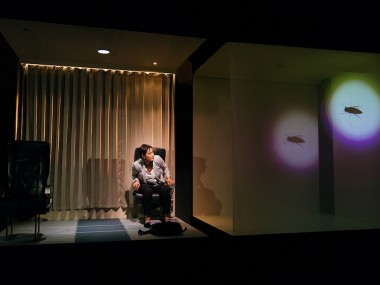The Flea, The Yard Theatre
Tuesday 17th October 2023

Famous sex scandals don’t always make good plays. Although the tabloid nature of such events appeals to our sense of guilty pleasures, the fact that we already know the outcome of events undermines the tension of the plot; and the cruel fact of history is that we know more about the privileged perpetrators of sexual crimes than about their poorer victims. So how does James Fritz imaginative new history play, The Flea, which retells the story of the Cleveland Street scandal of 1889, deal with these problems? Answer: firstly, by taking a leftfield approach, and secondly by siding with the victims.
The facts of the case are easily researched: in July 1889, Police Constable Luke Hanks was investigating a theft from the London Central Telegraph Office, and Charlie Swinscow, a 15-year-old telegraph boy, was discovered in possession of 14 shillings, a sum much larger than his wages. After questioning, he confessed to working as a rent boy for Charles Hammond at a male brothel at 19 Cleveland Street in posh Fitzrovia. Detective Inspector Frederick Abberline, who had been involved in the Jack the Ripper investigation, raided the premises, but they were empty.
Later, 18-year-old Henry Newlove, who had befriended Swinscow, named Lord Arthur Somerset and Henry FitzRoy, Earl of Euston, as clients of the brothel. A rumour circulated that Prince Albert Victor, the eldest son of “Bertie” Prince of Wales and second-in-line to the British throne, had been seen there. Although the working class youngsters, Charlie and Henry, were prosecuted, neither Euston nor Somerset, who was an equerry to royalty, were brought to court. To escape the law, Somerset left the country. The media hysteria whipped up by this case was a factor in creating the homophobic atmosphere which led to the persecution of Oscar Wilde for “gross indecency” in 1895.
Fritz’s leftfield approach starts with putting Emily Swinscow, teenage Charlie’s mother, centre stage. She is the play’s narrator and our guide through a story which, however simplified, is still quite convoluted and which features a list of more than 20 characters, including a rat and, in this production, a pantomime horse. The playwright, greatly helped by director Jay Miller and designers Naomi Kuyck-Cohen and Lambdog1066, also queers the story by smashing the binaries of fact/fiction, straight/gay, moral/immoral, and abuser/victim through a genre-busting dramaturgy. The result is partly documentary, partly farce, partly a Victorian romp, and partly an attempt to restore the voices of the Swinscow family, Emily and Charlie.
Fritz’s queering of the narrative starts with the title: inspired by an old Irish folk song he shows how a flea bites a rat, which jumps into the path of a horse, which kicks a man (who is killed) — because the man is Emily’s husband and Charlie’s father, his death leads to their impoverishment, and Charlie’s prostitution, facilitated by his friend Newlove. The scandal, which is portrayed both as playfully absurd and as tragic, affects the aristocrats Somerset and Euston, and in second act, reaches Bertie and Victoria. With a sideways glance at Edward Bond’s Early Morning and Caryl Churchill’s Cloud Nine, Fritz pictures not only the Queen’s ethical chat with God, but also her sexuality.
But it is Emily’s cockney charm that gives the storytelling a humorous slant, which also includes the whimsy of the narrative behind the willow-pattern plate pattern. The complexity of the play’s vision of Victorian London, which runs up and down the social scale, is enhanced by the fact that the detective in charge of investigating the scandal, Abberline, is trying to hide evidence of his incompetence in failing to stop Jack the Ripper. At the same time, the playwright’s sympathy with the working-class victims of upper class entitlement, namely Charlie, culminates in a final scene that is both emotionally excruciating and dramatically indecisive. While this makes a strong point about forgotten voices, it also leaves an unsatisfied taste in the mouth.
Fritz’s genre-bending fun extravaganza is not perfect, and there are several scenes which I feel could have been shortened, but it gets a tremendously vivid production by Miller and his team. The costumes are amusingly lavish, with splashes of colour and generous sprinklings of glitter, and the tone of tongue-in-cheek satire is delivered beautifully by Norah Lopez Holden, who is great as both Emily and Victoria, while newcomer Séamus McLean Ross is convincing as Charlie and funny as Bertie; Connor Finch, also making his stage debut, is Somerset and Newlove, while the excellent Scott Karim (Abberline) and Sonny Poon Tip (Euston) play multiple other roles. With a thumping soundtrack that includes Tindersticks, Jeff Beck and Handel, this is a refreshingly original take on the Victorian history play.
This review first appeared on The Theatre Times




